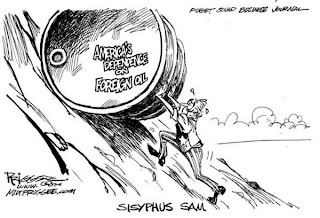Sunday, April 26, 2009
Thursday, April 23, 2009
Grammar

Descriptive verbs, I have a tendency to incorporate a lot of to be verbs in my writing. In order to eliminate excess to be verbs you can replace them with descriptive verbs. Descriptive verbs can be can be found by expanding ones vocabulary, and using more wordage in your writing. to view lists of descriptive verbs click HERE
Wednesday, April 22, 2009
America the beautiful, Dinesh D'Souza
 This essay comparing Islamic vs American ideals was very intriguing to read. In fact, I can easily say that it was one of my favorite essays all semester. D'Souza does a great job at keeping this essay on point, addressing views, claims, touching on principles and following all of them through to their conclusions. Not to mention the fact that he does get lost in bias tangents, or waste time on irrelevant material.
This essay comparing Islamic vs American ideals was very intriguing to read. In fact, I can easily say that it was one of my favorite essays all semester. D'Souza does a great job at keeping this essay on point, addressing views, claims, touching on principles and following all of them through to their conclusions. Not to mention the fact that he does get lost in bias tangents, or waste time on irrelevant material. 

Saturday, April 4, 2009
Dr. Charles Moseley. An Enduring Academic Legacy or Minding and Closing the Gap

 I went to the extra Credit lecture last night at the tabernacle building, which was presented by Dr. Charles Moseley from Cambridge University in Great Britain. The lecture was titled An Enduring Academic Legacy: or Minding and Closing the Gap. This was a lecture on humanities and actually turned out to be very intriguing.
I went to the extra Credit lecture last night at the tabernacle building, which was presented by Dr. Charles Moseley from Cambridge University in Great Britain. The lecture was titled An Enduring Academic Legacy: or Minding and Closing the Gap. This was a lecture on humanities and actually turned out to be very intriguing. 
Thursday, April 2, 2009
Grammar note, Defining the passive voice.
Rhetorical Modes

I have chosen to write my essay in Comparison/Contrast mode. However, for my post I found the Extended Definition writing mode, and Description mode particularly interesting.
Thursday, March 26, 2009
50 Questions of the founders foreign policy vs our current foreign policy
Thursday, March 5, 2009
The Internationale By Eugene Pottier

Arise ye workers from your slumbers
Arise ye prisoners of want
For reason in revolt now thunders
And at last ends the age of cant.
Away with all your superstitions
Servile masses arise, ariseWe'll change henceforth the old tradition
And spurn the dust to win the prize.
Refrain:
So comrades, come rally
And the last fight let us face
The Inte
rnationale unites the human race.
No more deluded by reaction
On tyrants only we'll make war
The soldiers too will take strike action
They'll break ranks and fight no more
And if those cannibals keep trying
To sacrifice us to their pride
They soon shall hear the bullets flying
We'll shoot the generals on our own side. No saviour from on high delivers
No saviour from on high delivers
No faith have we in prince or peer
Our own right hand the chains must shiver
Chains of hatred, greed and fear
E'er the thieves will out with their booty
And give to all a happier lot.
Each at the forge must do their duty
And we'll strike while the iron is hot.
Mixed Constructions/ Grammar

Grammar is always a great time right? This is a little out of the box, mixed constructions. Mixed constructions occur when a writer begins a sentence with one construction and, without realizing it, finishes with another. To see some examples of this look here: http://www.ucalgary.ca/UofC/eduweb/grammar/course/sentence/2_6e.htm I fall prey to this when I'm not dilligent enough, if you do too, I hope this helps.
Vicarious Living
This paper places strong emphasis on the media's destructive influence on society by distorting the lines of class and race within it. The media has a profound effect on what we see, read and hear and uses that to distort our perception of society. The author essentially exposes the medias power to socially destruct reality.
This paper is based on a very ethical appeal discussing the blurred separation of upper class
vs middle to lower class and race or ethenticity. the author supports her argument with numerous reports, statistics, and sources appealing to peoples logic, but driving at very ethical issues. exposing that people have become victims of consumerism driven by super media industries that view the public as a payday and bombard them with advertisements and make them desire things they don't need.
This paper is very effective covering all ends of the issue, and supporting it with sources. The author does a terrific job exposing this consumer disease with very influential rhetoric.
Wednesday, March 4, 2009
Serving in Florida by: Barbra Ehrenreich
The authors rhetoric is very descriptive, beginning her paper outlining a variety of disgusting foods, and talking about digestive details of fried foods going on and on sharing what she must have felt walking into this atmosphere. The focus throughout this paper is very negative, you can tell the author is very disgusted by every thing she's experiencing and wants her readers to feel how despicable this world is. The way she describes her job it seems like slavery not a healthy respectable working atmosphere, from the attitude of her boss to the ungrateful customers she's serving who don't pay her any respect. There's no time to break for lunch or go to the bathroom, as the physical demands of the job bring out pains in her body to which she cannot address.
The authors experience is very effective, providing a first hand account of this minimum wage world and illustrating how unjust and overwhelming it can be. It's is also clear that this is exactly what the author wanted to expose, her entire focus is on the ugly side of this life style, directing attention on how difficult it is, how ugly, how detrimental it is to the people and to our society.
Wednesday, February 25, 2009
Apostrophe's with possessive nouns and pronouns.
Thursday, February 19, 2009
Modifiers, my favorite :)
Wednesday, February 18, 2009
The Roots of Debate in Education and the Hope of Dialogue.

Tannens, Roots of debate in Education is focused on the educational system, and weather or not it aspires to assist students in obtaining all they can from their time in school, and weather it uses the best methods for all its students to learn to their full potential.



